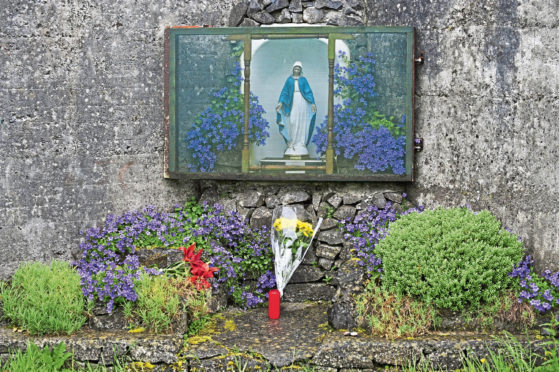Childhood Catholicism. Cold stone and flickering candles in the veiled gloom, a catechism of rules, dark confessionals where only men could sit in judgment. Across the road from primary school was a Nazareth Home.
I can scarcely remember the faces of my best friends back then, yet I can still vividly see Kay, my classmate who lived in the convent. I was frightened of her “otherness”: her withdrawn manner; her worn, ill-fitting uniform; the way teachers spoke to her with a coldness I did not understand. But mostly I was frightened of the mysterious place she lived, the closed iron gates and the motherless nature of her existence.
Kay came to mind last week when the long-awaited report into Ireland’s mother and baby homes was published.
It was prompted by 2014 revelations that almost 800 children were secretly buried at the Bon Secours mother and baby home at Tuam. Human infant remains were also found at Sean Ross in County Tipperary, and at Bessborough in County Cork, where it was revealed 75% of babies admitted to the home in 1943 had died. But children were buried in unmarked graves at Bessborough right up to 1990, when it closed. This is not merely a historical scandal.
As a child, I breathed in the hierarchy of Catholicism in a visceral way that only as an adult would I understand. The misogyny. The hierarchy of worth. The control exercised in judgment and condemnation that has been exposed not just in Ireland but around the world.
Survivors’ testimony in last week’s report told of cruelty and coercion; of illegal, forced adoptions in which children were sold for money against their mothers’ wishes; of children being used for medical trials without consent or adherence to ethical guidelines and dead babies being secretly used for anatomical research. Sub-human treatment of sinners by the righteous.
There has been an apology, of course – words always flow – an apology victims asked to be delayed until they digested the report. They couldn’t even control that so who was it for, that ‘sorry’?
Irish Taoiseach, Eamon Martin, blamed society for the scandal. It was the fault of the babies’ fathers. The fault of the mothers’ families, whose sense of shame demanded secrecy. But what about the Church who perpetuated that sense of shame and allowed abuse to flourish? What about the state, which colluded silently, paying the Church for its “care” of society’s unwanted and disempowered?
It seems the powerful are always protected. Apology? What about legal accountability for criminal actions? Ironic, then, that the Catholic Church proposes legal action when it suits them.
A Scottish priest is currently raising £50,000 to oppose the Scottish Government’s Covid restrictions that keep churches closed. The arrogance of demanding churchgoers should gather when the rest of Scottish society cannot is hard to fathom. But the attitude of “we are special/different/saved” fuelled Church behaviour outlined in the Irish report.
Last week, two senior Scottish Catholic clergymen died with Covid complications. Normally, their funerals would be pageants of pomp and circumstance, of scarlet robes and ceremonial mitres, of gold staffs and ornate crucifixes. This is a Church that excels in ritual and drama. Yet it is also the Church that experimented on children it considered worthless, which threw the bones of dead babies into mass, unmarked graves because they merited nothing more. The Taoiseach got one thing right in his statement. “What was striking was the complete absence of basic kindness.”
I never thought of Kay again until many years later, when researching the scandals of the Nazareth Homes. I listened to a lady in her seventies who cried like a little girl, the raw tears of her inner child, and I understood, then, the lifelong effect of childhood trauma. And I vowed never to be silent or afraid again.
The scale of trauma in the Irish report is shocking but sadly, no longer surprising. At first, it was proposed that survivors’ testimonies be hidden in the National Archive for 75 years, the institutional cover-up we have come to expect. It is still proposed that flats be built over unmarked graves before bodies are located, exhumed, or buried decently. It’s not good enough.
This time, the apology has to come from the heart and not just the lips of those responsible. Change must follow. For all the old ladies, the Kays, the discarded babies, this time we need more than just “sorry”.
